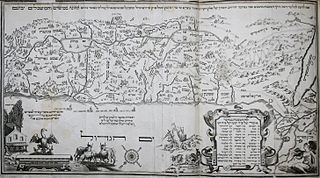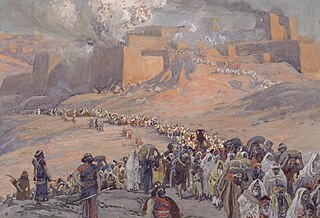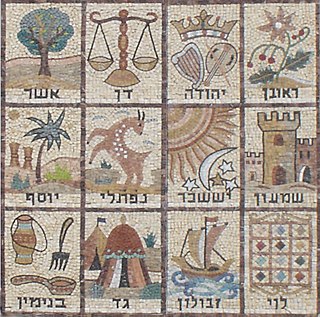Jewish commonwealth may refer to:

The history of Israel covers an area of the Southern Levant also known as Canaan, Palestine or the Holy Land, which is the geographical location of the modern states of Israel and Palestine. From a prehistory as part of the critical Levantine corridor, which witnessed waves of early humans out of Africa, to the emergence of Natufian culture c. 10th millennium BCE, the region entered the Bronze Age c. 2,000 BCE with the development of Canaanite civilization, before being vassalized by Egypt in the Late Bronze Age. In the Iron Age, the kingdoms of Israel and Judah were established, entities that were central to the origins of the Jewish and Samaritan peoples as well as the Abrahamic faith tradition. This has given rise to Judaism, Samaritanism, Christianity, Islam, Druzism, Baha'ism, and a variety of other religious movements. Throughout the course of human history, the Land of Israel has come under the sway or control of various polities and, as a result, it has historically hosted a wide variety of ethnic groups.

The history of ancient Israel and Judah begins in the Southern Levant region of Western Asia during the Late Bronze Age and Early Iron Age. The earliest known reference to "Israel" as a people or tribal confederation is in the Merneptah Stele, an inscription from ancient Egypt that dates to about 1208 BCE, but the people group may be older. According to modern archaeology, ancient Israelite culture developed as an outgrowth from the pre-existing Canaanite civilization. Two related Israelite polities known as the Kingdom of Israel (Samaria) and the Kingdom of Judah had emerged in the region by Iron Age II.

Jerusalem is an ancient city in West Asia, on a plateau in the Judaean Mountains between the Mediterranean and the Dead Sea. It is one of the oldest cities in the world, and is considered holy to the three major Abrahamic religions—Judaism, Christianity, and Islam. Both Israel and Palestine claim Jerusalem as their capital; Israel maintains its primary governmental institutions there, and the State of Palestine ultimately foresees it as its seat of power. Neither claim, however, is widely recognized internationally.

Yahweh was an ancient Levantine deity, and national god of the Israelite kingdoms of Israel and Judah. Though no consensus exists regarding the deity's origins, scholars generally contend that Yahweh emerged as a "divine warrior" associated first with Seir, Edom, Paran and Teman, and later with Canaan. The origins of his worship reach at least to the early Iron Age, and likely to the Late Bronze Age, if not somewhat earlier.

Zionism is a nationalist movement that emerged in the 19th century to enable the establishment of a homeland for the Jewish people in Palestine, a region roughly corresponding to the Land of Israel in Jewish tradition. Following the establishment of the modern state of Israel, Zionism became an ideology that supports the development and protection of the State of Israel as a Jewish state.

The Israelites were a group of Semitic-speaking tribes in the ancient Near East who, during the Iron Age, inhabited a part of Canaan.

The Babylonian captivity or Babylonian exile is the period in Jewish history during which a large number of Judeans from the ancient Kingdom of Judah were captives in Babylon, the capital city of the Neo-Babylonian Empire, following their defeat in the Jewish–Babylonian War and the destruction of Solomon's Temple in Jerusalem. The event is known to be historical, and is described in archaeological and extra-biblical sources, in addition to the Hebrew Bible.

A homeland for the Jewish people is an idea rooted in Jewish history, religion, and culture. The Jewish aspiration to return to Zion, generally associated with divine redemption, has suffused Jewish religious thought since the destruction of the First Temple and the Babylonian exile.

Jewish history is the history of the Jews, and their nation, religion, and culture, as it developed and interacted with other peoples, religions, and cultures.

Yavne or Yavneh is a city in the Central District of Israel. In many English translations of the Bible, it is known as Jabneh.

The Jewish diaspora or exile is the biblical dispersion of Israelites or Jews out of their ancient ancestral homeland and their subsequent settlement in other parts of the globe.

Palestine is a geographical region in West Asia. Situated in the Southern Levant, it is usually considered to include Israel and the State of Palestine, though some definitions also include parts of northwestern Jordan. Other historical names for the region include Canaan, the Promised Land, the Land of Israel, or the Holy Land.

Rabbinic authority in Judaism relates to the theological and communal authority attributed to rabbis and their pronouncements in matters of Jewish law. The extent of rabbinic authority differs by various Jewish groups and denominations throughout history.
The Paleo-Hebrew script, also Palaeo-Hebrew, Proto-Hebrew or Old Hebrew, is the writing system found in inscriptions of Canaanite languages from the region of Southern Canaan, also known as biblical Israel and Judah. It is considered to be the script used to record the original texts of the Hebrew Bible due to its similarity to the Samaritan script, as the Talmud stated that the Hebrew ancient script was still used by the Samaritans. The Talmud described it as the "Libona'a script", translated by some as "Lebanon script". Use of the term "Paleo-Hebrew alphabet" is due to a 1954 suggestion by Solomon Birnbaum, who argued that "[t]o apply the term Phoenician [from Northern Canaan, today's Lebanon] to the script of the Hebrews [from Southern Canaan, today's Israel-Palestine] is hardly suitable". The Paleo-Hebrew and Phoenician alphabets are two slight regional variants of the same script.

The Twelve Tribes of Israel are, according to Hebrew scriptures, the descendants of the biblical patriarch Jacob, who collectively form the Israelite nation. The tribes were through his twelve sons through his wives, Leah and Rachel, and his concubines, Bilhah and Zilpah. In modern scholarship, there is skepticism as to whether there ever were twelve Israelite tribes, with the use of the number 12 thought more likely to signify a symbolic tradition as part of a national founding myth, although some scholars disagree with this view.
The Gathering of Israel, or the Ingathering of the Jewish diaspora, is the biblical promise of Deuteronomy 30:1–5, made by Moses to the Israelites prior to their entry into the Land of Israel.
The history of the Jews and Judaism in the Land of Israel begins in the 2nd millennium BCE, when Israelites emerged as an outgrowth of southern Canaanites, During biblical times, a postulated United Kingdom of Israel existed but then split into two Israelite kingdoms occupying the highland zone: the Kingdom of Israel (Samaria) in the north, and the Kingdom of Judah in the south. The Kingdom of Israel was conquered by the Neo-Assyrian Empire, and the Kingdom of Judah by the Neo-Babylonian Empire. Initially exiled to Babylon, upon the defeat of the Neo-Babylonian Empire by the Achaemenid Empire under Cyrus the Great, many of the Jewish exiles returned to Jerusalem, building the Second Temple.

The following outline is provided as an overview of and topical guide to Israel:

Jews or Jewish people are an ethnoreligious group and nation originating from the Israelites of the ancient Near East, and whose traditional religion is Judaism. Jewish ethnicity, religion, and community are highly interrelated, as Judaism is an ethnic religion, although not all ethnic Jews practice it. Despite this, religious Jews regard individuals who have formally converted to Judaism as part of the community.
Second Temple Judaism is the Jewish religion as it developed during the Second Temple period, which began with the construction of the Second Temple around 516 BC and ended with the Roman siege of Jerusalem in 70 AD.